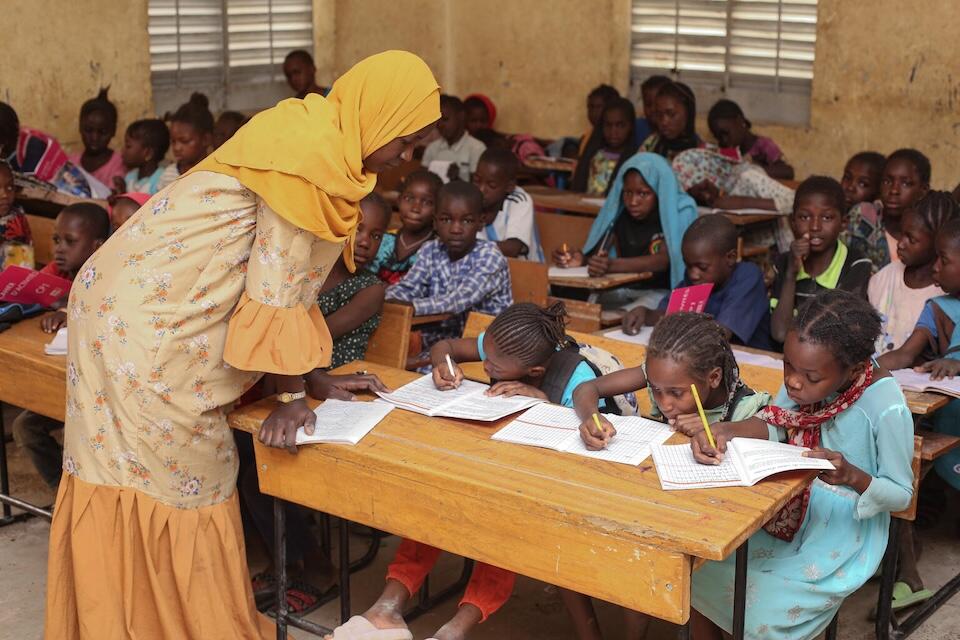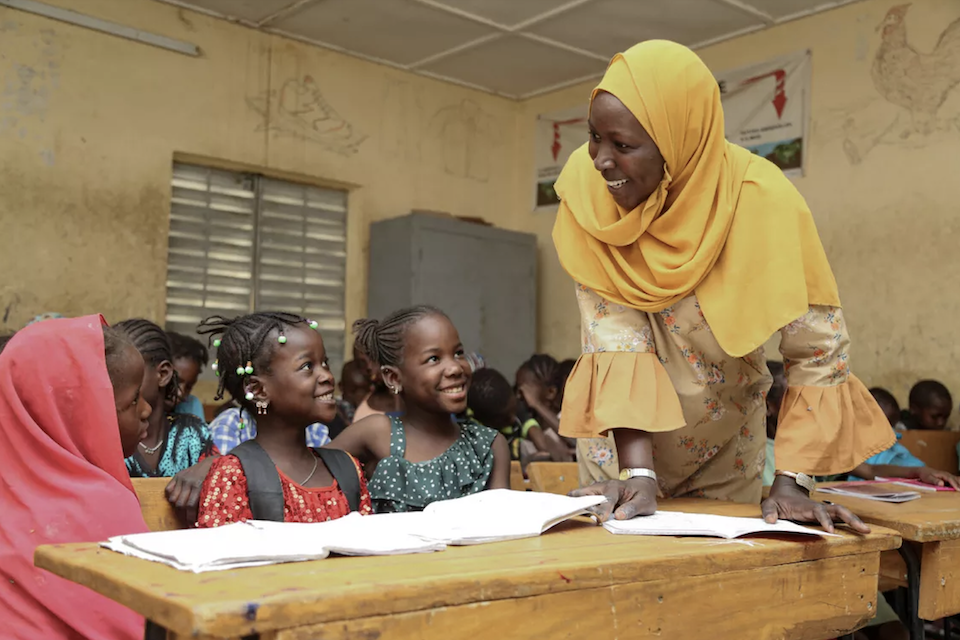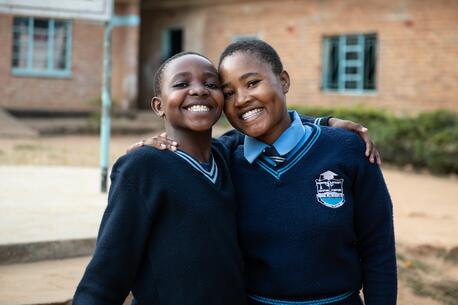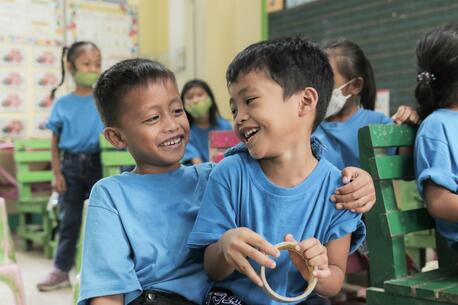Catch-Up Classes an On-Ramp to Education for Out-of-School Kids in Mali
Innovative programs delivered by UNICEF through an Education Cannot Wait investment are helping children get back to learning in Mali.
Reading Corners provide a welcoming introduction to formal education
More than 7 million people are in need of humanitarian aid in Mali — and over half of them are children. Violent attacks and threats on schools, insecurity, poverty, hunger, climate change, forced displacement and other challenges are ripping lives apart and threatening to leave an entire generation behind. Over half of Mali’s young people between the ages of 15 and 24 are illiterate. Two million children are out of school altogether.
These are the forgotten voices of one of Africa’s largest and most often overlooked crises. But with the safety, power and opportunity of a quality education, girls like Mouly, 12, will not be silenced.

Mouly isn’t your average third grader. She’s the oldest girl in her class, and also one of the most promising. Faced with severe financial constraints, Mouly’s parents never had the opportunity to send their daughter to school. Instead, she would hang out behind Mahamane Fondougoumo School in Timbuktu — one of the oldest in the city — no doubt with the hope that one day the doors would open for her.
And one day, those doors finally opened. The school principal, Abdoulaye Alhousseyni, spotted Mouly outside the building. He met with her family and found out they had never been able to afford school.
Since she still didn’t know how to read or write, the principal enrolled Mouly in the school’s innovative Reading Corner. The program helps out-of-school girls and boys like Mouly to enter the classroom for the first time in a welcoming and nurturing environment. Five months into the program, Mouly is finding her way. She has already acquired basic reading and writing skills. With dedicated holistic support, she is now nearly at the same level as her third-grade classmates.
"I am happy. I am learning lots of new things," says Mouly.
ECW and UNICEF work closely with partners to ensure every child has the opportunity to go to school and learn
Delivered by UNICEF through a multi-year investment from Education Cannot Wait (ECW), the global fund for education in emergencies and protracted crises, in coordination with Mali's Ministry of National Education and NGO partner Association Subaahi Gumo, the Reading Corner at the Mahamane Fondougoumo School has welcomed more than 70 children (including 42 girls) since it was established two years ago.
"Most of these children are among the best in their classes. It's an encouragement for the parents who ensure that their children do not miss any of the Reading Corner sessions. The program is free," explains Principal Alhousseyni.
ECW’s investments in Mali now top $29 million and have reached close to 500,000 children with quality education supports. Community mobilization campaigns to encourage re-enrollment of out-of-school children have reached 17,000 children, included 1,800 who are now attending Reading Corners across 36 schools. Other holistic education supports include school feeding programs, access to water, sanitation and hygiene, the rehabilitation of classrooms, mental health and psychosocial support, and financial incentives for teachers.
© UNICEF/UNI535982/
A number of children from Mali have shared their stories of hope and resilience through Education Cannot Wait’s Postcards from the Edge campaign. Their names have been changed to preserve their privacy.
Awa dreams one day of becoming a nurse. “When we left our village, we lost everything. My parents are managing to feed our family. To achieve my dream, I need to continue my studies. I’m calling on all the leaders of the world, in particular Education Cannot Wait and its partners, to help us and all the other children who are victims of crisis and who are in an emergency situation.”
Adama is 13-year-old boy living – and thriving – with a hearing impairment. “I would like to continue my studies to take up challenges and actively participate in the development of my country, make decisions and show humanity that every living being, even with physical difficulties, deserves a place in our society. I am deaf and I deserve quality education that allows me to realize my dreams. I am a child, and my place is in the classroom.”
I am deaf and I deserve quality education that allows me to realize my dreams. I am a child, and my place is in the classroom. — Adama, 13
Kadida, 13, believes education should be a priority. “Today, too many children are deprived of their right to education because of their disadvantaged status and their handicap. Some children are excluded from education due to poverty. The place of the child is in school. You all have a role to play so that no child is left behind. We need schools, adequate teaching materials, textbooks for all learners, regardless of their identity, origins or abilities. 'Education for All' must be addressed to all, without exception, and not just to a privileged few.”

Investment in education has the power to change lives and strengthen communities
The dream of quality education for all, as outlined in the Sustainable Development Goals, is falling behind. And Mali is, in fact, one of the most underfunded crises in the world today.
A total of 1,743 schools were non-operational in February 2024 mostly due to insecurity, affecting over 522,000 children and 10,400 teachers. Despite this deteriorating context, funding for the education sector in 2023 represented only 3.5 percent of total humanitarian funding. UNICEF has appealed for $133.5 million to respond to the humanitarian needs of children and women in Mali in 2024. So far, only 5 percent of the $32.5 million appeal for the education sector has been covered.
As we celebrate the African Year of Education, Education Cannot Wait is joining UNICEF and other key strategic partners in calling on world leaders to provide urgent funding for Africa’s forgotten crises. With $600 million in additional funding, ECW and its partners including UNICEF can reach a total of 20 million crisis-impacted girls and boys by 2026.
UNICEF works with partners around the world to ensure that every child has the support and opportunities they need to reach their full potential. Your contribution will make a difference. Please donate.
HOW TO HELP
There are many ways to make a difference
War, famine, poverty, natural disasters — threats to the world's children keep coming. But UNICEF won't stop working to keep children healthy and safe.
UNICEF works in over 190 countries and territories — more places than any other children's organization. UNICEF has the world's largest humanitarian warehouse and, when disaster strikes, can get supplies almost anywhere within 72 hours. Constantly innovating, always advocating for a better world for children, UNICEF works to ensure that every child can grow up healthy, educated, protected and respected.
Would you like to help give all children the opportunity to reach their full potential? There are many ways to get involved.





